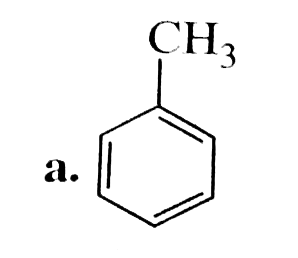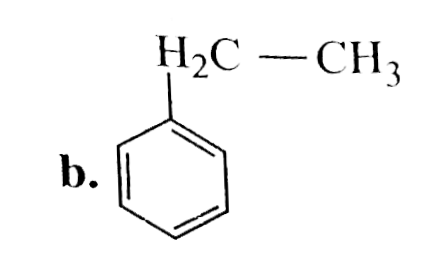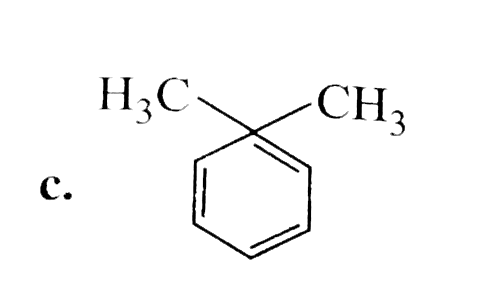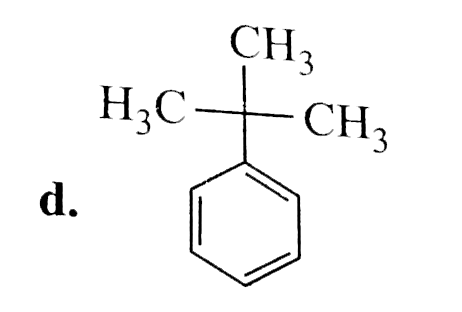Which of the folliwng compounds is the most reactive towards electrophilic substitution reaction?




The correct Answer is:a
To determine which of the given compounds is the most reactive towards electrophilic substitution reactions, we need to analyze the compounds based on the presence of electron-donating groups and the concept of hyperconjugation. Here’s a step-by-step solution:
Step 1: Understand Electrophilic Substitution
Electrophilic substitution reactions involve the attack of an electrophile on a benzene ring. The reactivity of the benzene derivative in these reactions is influenced by the substituents attached to the ring.
Hint: Remember that electrophiles are attracted to regions of high electron density.
Step 2: Identify Electron-Donating Groups
Electron-donating groups (EDGs) increase the electron density on the benzene ring, making it more reactive towards electrophiles. Common EDGs include alkyl groups, which can stabilize the carbocation intermediate formed during the reaction.
Hint: Look for groups that can donate electron density, such as alkyl groups.
Step 3: Consider Hyperconjugation
Hyperconjugation is the interaction of sigma electrons from adjacent carbon-hydrogen bonds with the empty or partially filled p-orbitals of the benzene ring. The more alpha hydrogens (hydrogens attached to the carbon adjacent to the benzene ring), the greater the hyperconjugation effect, which enhances reactivity.
Hint: Count the number of alpha hydrogens in each compound, as this will indicate the potential for hyperconjugation.
Step 4: Analyze Each Compound
1. Compound A: Contains a methyl group (3 alpha hydrogens).
2. Compound B: Contains an ethyl group (2 alpha hydrogens).
3. Compound C: Is simply benzene (0 alpha hydrogens).
4. Compound D: Also has no alpha hydrogens (0 alpha hydrogens).
Hint: Identify the alpha carbon for each compound and count the corresponding alpha hydrogens.
Step 5: Compare Reactivity
- Compound A has 3 alpha hydrogens, thus it has the highest potential for hyperconjugation and is the most reactive.
- Compound B has 2 alpha hydrogens, making it less reactive than Compound A.
- Compound C and Compound D have no alpha hydrogens, making them the least reactive.
Hint: The compound with the most alpha hydrogens will be the most reactive towards electrophilic substitution.
Conclusion
Based on the analysis, Compound A is the most reactive towards electrophilic substitution reactions due to the presence of the methyl group, which provides the highest number of alpha hydrogens (3) and thus the greatest hyperconjugation effect.
Final Answer: Compound A is the most reactive towards electrophilic substitution.
Electrophilic substitution reactions involve the attack of an electrophile on a benzene ring. The reactivity of the benzene derivative in these reactions is influenced by the substituents attached to the ring.
Electron-donating groups (EDGs) increase the electron density on the benzene ring, making it more reactive towards electrophiles. Common EDGs include alkyl groups, which can stabilize the carbocation intermediate formed during the reaction.
Hyperconjugation is the interaction of sigma electrons from adjacent carbon-hydrogen bonds with the empty or partially filled p-orbitals of the benzene ring. The more alpha hydrogens (hydrogens attached to the carbon adjacent to the benzene ring), the greater the hyperconjugation effect, which enhances reactivity.
1. Compound A: Contains a methyl group (3 alpha hydrogens).
2. Compound B: Contains an ethyl group (2 alpha hydrogens).
3. Compound C: Is simply benzene (0 alpha hydrogens).
4. Compound D: Also has no alpha hydrogens (0 alpha hydrogens).
- Compound A has 3 alpha hydrogens, thus it has the highest potential for hyperconjugation and is the most reactive.
- Compound B has 2 alpha hydrogens, making it less reactive than Compound A.
- Compound C and Compound D have no alpha hydrogens, making them the least reactive.
Based on the analysis, Compound A is the most reactive towards electrophilic substitution reactions due to the presence of the methyl group, which provides the highest number of alpha hydrogens (3) and thus the greatest hyperconjugation effect.
Topper's Solved these Questions
- BOOK - CENGAGE CHEMISTRY ENGLISHCHAPTER - AROMATIC COMPOUNDS AND ALKYL AND ARYL HALIDES EXERCISE - Exercises Assertion-Resoning Type1videos
AROMATIC COMPOUNDS AND ALKYL AND ARYL HALIDES
- BOOK - CENGAGE CHEMISTRY ENGLISHCHAPTER - AROMATIC COMPOUNDS AND ALKYL AND ARYL HALIDES EXERCISE - Exercises Assertion-Resoning11videos
AROMATIC COMPOUNDS AND ALKYL AND ARYL HALIDES
- BOOK - CENGAGE CHEMISTRY ENGLISHCHAPTER - AROMATIC COMPOUNDS AND ALKYL AND ARYL HALIDES EXERCISE - Exercises Single Correct Answer Type28videos
AROMATIC COMPOUNDS AND ALKYL AND ARYL HALIDES
- BOOK - CENGAGE CHEMISTRY ENGLISHCHAPTER - APPENDIX INORGANIC VOLUME 2EXERCISE - Short Answer Type179videos
APPENDIX INORGANIC VOLUME 2
- BOOK - CENGAGE CHEMISTRY ENGLISHCHAPTER - BIOMOLECULESEXERCISE - Exercises Archives (Analytical And Descriptive)8videos
BIOMOLECULES
Similar Questions
Knowledge Check
- Question 1 - Select One
Which of the following is the most reactive towards nucleophilic substitution reaction?
AClCH2−CH=CH2BCH2=CH−ClCCH3CH=CH−ClDC6H5Cl - Question 2 - Select One
Which of the following compounds is most reactive towards nucleophilic addition reactions ?
ACH3−O∣∣C−HBCH3−O∣∣C−CH3C D
D
- Question 3 - Select One
Which of the following compounds is most reactive towards nucleophilic addition reactions ?
ACH3−O∣∣C−HBCH3−O∣∣C−CH3C D
D
Which of the following compounds is most reactive in electrophilic aromatic substitution?
View SolutionConsider the following compounds:

the correct order towards electrophilic substitution reaction isView SolutionWhich of the following compound is most reactive in the nucleophilic aromatic substitution reaction with NaOH ?
View SolutionWhich of the following compounds is most reactive towards nucleophilic addition reactions ?
View SolutionWhich of the following compounds is most reactive towards nucleophilic addition reactions ?
View Solution

